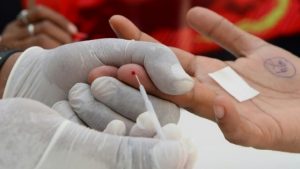Through the provision of Voluntary Medical Male Circumcision, South Africa has managed to avert 650-thousands new HIV infections among men. Research has proven that this can reduce the risk of female-to-male sexual transmission of HIV by as much as 60%. With one of the largest HIV epidemics in the world, South Africa has over 7-million people living with HIV. Almost 300-thousands new infections annually. In 2002 a study was designed in Orange Farm, south of Johanesburg, to measure the effectiveness of circumcision in reducing the rate of HIV infection.
Orange Farm was the site of the first of three randomised control trials that showed that circumcision reduces the risk of men contracting HIV. According to the study that has been conducted, the Centre for HIV and AIDS Prevention Studies in Orange Farm has now carried out approximately 25000 circumcisions since 2008. The centre circumcises more than hundred males a day. Dr Dumisani Mhlambi from the centre says there are more benefits from male circumcision.
” By getting circumcised males get to acquire less of Human Popular Virus which we know unto the female counter parts maybe responsible for the cancer of the cervic. And therefore if the male circumcised and has lesser chances of acquiring the Human Popular Virus they therefore stnd a lesser chance of actually transmitting the very virus to their female counter parts,” he said.
However a health worker at the Centre Mpho Tlebere says there are challenges they encounter in order to convince men to circumcise.
“The only challenges that we have when we are at the field is that sometimes you come across those guys that are from the initiation school. At times they will give you tough time. But we do explain to them that they can always come to the clinic for circumcision because it is done in a sterile, good condition before they can go to the initiation school. Some of them they do but to our story they do come and do circumcisions. And another challenge that we have in the field is those that believe in religion. They will tell us that their religion does not allow them to do circumcision.”
A twenty one year old, Thabang Nhlapo who lives in Orange Farm says the thought of circumcising has never crossed his mind despite the service being offered for free. ” Personally, I never thought that I should go and get circumcised, I don’t have reasons of not going there but I know I should do it.”
A twenty seven year old, who didn’t want his name published, has called on all young men to circumcise at an early age to avoid complications.
“I was encouraged by my girlfriend to go and get circumcised to reduce chances of contracting diseases. I had problems because I had to wash it everyday but after that things changed. And my experiences is that it was hard before but it was cool after. My advise is that don’t wait until your girlfriend pushes you to go but go while you are still young.”
Director of Medical Male Circumcision at the National Health Department, Collen Bonnecwe says some of the men are reluctant to get circumcised for various reasons.






